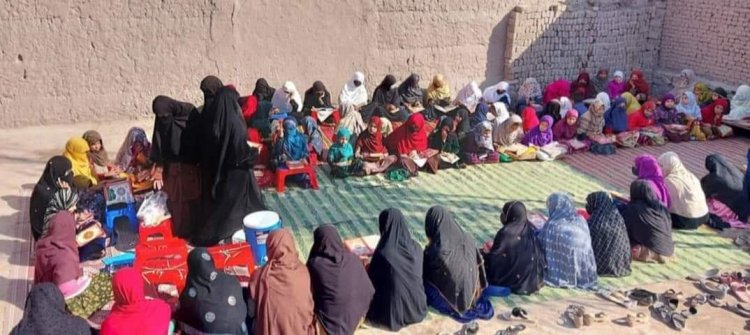Inside Afghanistan’s Girls’ Religious Schools: Hopes and Limits

With secondary schools and universities closed to girls across Afghanistan, thousands have been pushed into religious schools. Over the past four years, the number of these schools has surged nationwide. Yet many girls say this education offers them little future and serves only as an unwanted substitute for formal schooling and a temporary escape from staying at home.
Hana, an eighth-grade student, exemplifies this generation. Once dreaming of becoming a doctor, she now spends her days memorizing Quran at a religious school.
“When schools and universities closed, all my hopes turned to ashes,” she says. “I had no choice but to attend a religious school. Now I’m memorizing Quran, but my school lessons have faded from memory, and I don’t know what my academic future holds.”
In Kabul’s Shakardara district, rows of young girls recite Quran under the supervision of 39-year-old Zainab Mohammadi. This school was established with support from a charitable foundation and operates under the direct oversight of the Taliban.
Mohammadi says that since girls’ schools and universities were closed, religious schools have multiplied, and most of her students are girls deprived of formal education.
“The curriculum comes from the Taliban,” she explains. “Instead of regular school subjects, we teach Arabic and religious studies. Students spend five hours a day in class, and because they have received basic lessons, they learn very well.”
According to her, girls who want to learn Quranic interpretation are taught separately, with a teacher explaining the text in their local language, Pashto or Dari.
Mohammadi also notes the constant presence of Taliban “Promotion of Virtue” officers: “Several times a week, male officers visit to ensure the girls observe the hijab. They promised to provide transportation for students from remote areas, but so far nothing has been done.”
When asked about the students’ educational future, her response is vague: “The Taliban have promised to issue twelfth-grade certificates for girls attending religious schools,” yet there is no practical mechanism to recognize these certificates, leaving the girls’ future uncertain.
Gulsoom, a former English literature student at the same religious school, came after the university closure, following her friends’ advice. “I was in my second year of university when the Taliban barred us from education. I had nothing to do at home and felt depressed. My friends suggested I attend a religious school,” she says.
She adds, “It’s very hard to study Arabic and religious subjects instead of English literature. But what can I do? I have no other choice.”
The surge in girls attending religious schools coincides with a report from Al Arabiya. According to the report, Taliban leader Hibatullah Akhundzada has instructed the Ministries of Education and Higher Education to further restrict girls’ education in religious schools. The plan will begin by limiting enrollment and gradually be implemented nationwide. Sources say the move comes from concerns about teaching modern subjects in religious schools.
